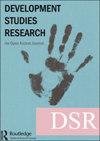Achieving inclusive growth? Wage dynamics in Cambodia, Laos and Vietnam
Q2 Social Sciences
引用次数: 0
Abstract
ABSTRACT This paper assesses whether industrial growth in Cambodia, Laos and Vietnam has been inclusive. While inclusiveness of growth is both a highly debated topic in the development discourse and an official government ambition in all three countries, it has not been assessed systematically in this context. In this paper, we focus specifically on one aspect of inclusiveness by examining the wage inequality between five occupational levels in the manufacturing sector. Based on survey data of companies operating in the electronics, food and beverage, and garment sectors, we show that average wage levels have increased for all occupational levels (although at different rates). We observe a U-shaped wage growth distribution, and argue that this could be a result of automation, dependency on foreign buyers, or an oversupply of pre-employment training programs at the technician level. We further observe particularly high wage growth for lower occupational levels in Cambodia and Laos – indicating relatively inclusive wage growth. In Vietnam, however, there is a development towards more wage inequality. Lastly, our study finds a clear convergence effect in the manufacturing sector; here, improved market information or increased labor mobility and reallocation of (training) resources could be contributing factors.实现包容性增长?柬埔寨、老挝和越南的工资动态
本文评估了柬埔寨、老挝和越南的工业增长是否具有包容性。虽然包容性增长既是发展话语中备受争议的话题,也是这三个国家的官方目标,但在这一背景下尚未对其进行系统评估。在本文中,我们通过研究制造业五个职业级别之间的工资不平等,专门关注包容性的一个方面。根据对电子、食品、饮料和服装行业公司的调查数据,我们发现所有职业的平均工资水平都在增长(尽管增长速度不同)。我们观察到工资增长呈u型分布,并认为这可能是自动化、对外国买家的依赖或技术人员职前培训项目供过于求的结果。我们进一步观察到柬埔寨和老挝较低职业水平的工资增长特别高,这表明工资增长相对具有包容性。然而,在越南,工资不平等正在加剧。最后,我们的研究发现制造业存在明显的趋同效应;在这里,改善市场信息或增加劳动力流动性和(培训)资源的重新分配可能是促成因素。
本文章由计算机程序翻译,如有差异,请以英文原文为准。
求助全文
约1分钟内获得全文
求助全文
来源期刊

Development Studies Research
Social Sciences-Development
CiteScore
3.20
自引率
0.00%
发文量
20
审稿时长
12 weeks
期刊介绍:
Development Studies Research ( DSR) is a Routledge journal dedicated to furthering debates in development studies. The journal provides a valuable platform for academics and practitioners to present their research on development issues to as broad an audience as possible. All DSR papers are published Open Access. This ensures that anyone, anywhere can engage with the valuable work being carried out by the myriad of academics and practitioners engaged in development research. The readership of DSR demonstrates that our goal of reaching as broad an audience as possible is being achieved. Papers are accessed by over 140 countries, some reaching over 9,000 downloads. The importance of the journal to impact is thus critical and the significance of OA to development researchers, exponential. Since its 2014 launch, the journal has examined numerous development issues from across the globe, including indigenous struggles, aid effectiveness, small-scale farming for poverty reduction, sustainable entrepreneurship, agricultural development, climate risk and the ‘resource curse’. Every paper published in DSR is an emblem of scientific rigour, having been reviewed first by members of an esteemed Editorial Board, and then by expert academics in a rigorous review process. Every paper, from the one examining a post-Millennium Development Goals environment by one of its architects (see Vandermortele 2014), to ones using established academic theory to understand development-imposed change (see Heeks and Stanforth 2015), and the more policy-oriented papers that contribute valuable recommendations to policy-makers and practitioners (see DSR Editor’s Choice: Policy), reaches a multidisciplinary audience.
 求助内容:
求助内容: 应助结果提醒方式:
应助结果提醒方式:


